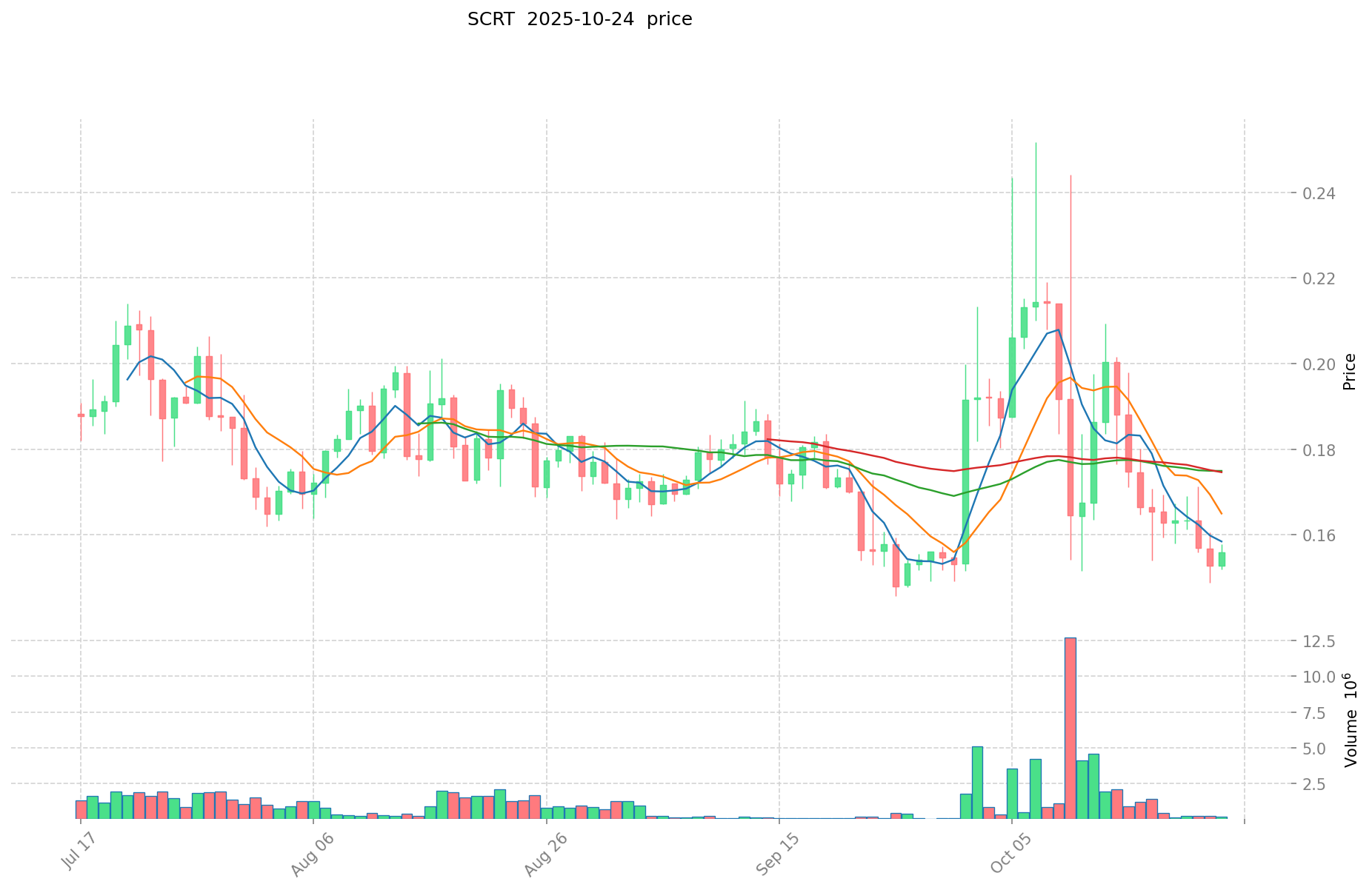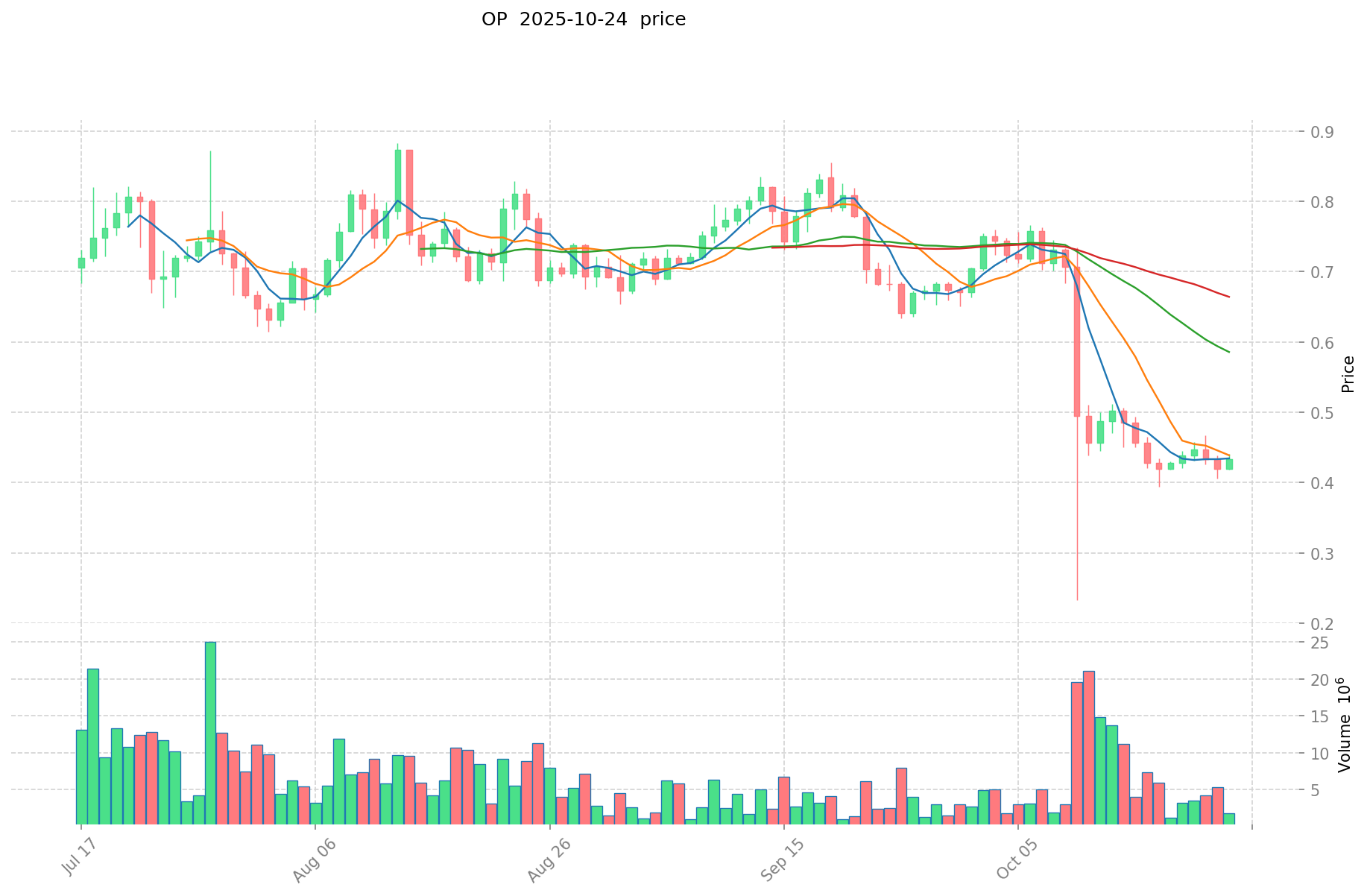SCRT vs OP: Comparing Privacy and Scalability Solutions in the Ethereum Ecosystem
Introduction: SCRT vs OP Investment Comparison
In the cryptocurrency market, the comparison between Secret (SCRT) and Optimism (OP) has been an unavoidable topic for investors. The two not only show significant differences in market cap ranking, application scenarios, and price performance but also represent different positioning in the crypto asset space.
Secret (SCRT): Since its launch, it has gained market recognition for its unique privacy-preserving smart contracts.
Optimism (OP): Introduced as a low-cost, lightning-fast Ethereum Layer 2 solution, it has become one of the most prominent scaling solutions in the crypto ecosystem.
This article will comprehensively analyze the investment value comparison between SCRT and OP, focusing on historical price trends, supply mechanisms, institutional adoption, technological ecosystems, and future predictions, attempting to answer the question investors care about most:
"Which is the better buy right now?" Here is the report based on the provided template and information:
I. Price History Comparison and Current Market Status
SCRT (Coin A) and OP (Coin B) Historical Price Trends
- 2021: SCRT reached its all-time high of $10.38 due to the overall crypto market bull run.
- 2024: OP hit its peak price of $4.84 in March, likely influenced by developments in the Ethereum layer 2 ecosystem.
- Comparative analysis: In the recent market cycle, SCRT dropped from its high of $10.38 to a low of $0.136796, while OP declined from $4.84 to its current price of $0.4332.
Current Market Situation (2025-10-24)
- SCRT current price: $0.1554
- OP current price: $0.4332
- 24-hour trading volume: SCRT $27,971.95 vs OP $795,877.29
- Market Sentiment Index (Fear & Greed Index): 27 (Fear)
Click to view real-time prices:
- Check SCRT current price Market Price
- Check OP current price Market Price


II. Key Factors Influencing SCRT vs OP Investment Value
Supply Mechanism Comparison (Tokenomics)
- SCRT: Community-owned token with emphasis on distribution model
- OP: Layer 2 token designed to support Ethereum scaling through Rollup technology
- 📌 Historical Pattern: In consolidation cycles, Layer 2 tokens like OP tend to gain more attention due to their role in enhancing Ethereum's market positioning.
Institutional Adoption and Market Applications
- Institutional Holdings: Layer 2 solutions appear to have stronger institutional interest during Ethereum upgrade cycles
- Enterprise Adoption: OP contributes to Ethereum's scalability, potentially attracting greater enterprise integration
- Regulatory Attitudes: Limited information on specific regulatory approaches to either token
Technical Development and Ecosystem Building
- OP Technical Development: Focus on Rollup technology to improve Ethereum's transaction processing capacity and efficiency
- SCRT Technical Development: Value primarily derived from community ownership rather than technological innovations
- Ecosystem Comparison: OP's ecosystem benefits from alignment with Ethereum's growth trajectory
Macroeconomic Factors and Market Cycles
- Performance in Crypto Market Cycles: Layer 2 tokens like OP typically receive increased attention during Ethereum consolidation phases
- Market Trends: Community-driven projects like SCRT rely heavily on ecosystem participation and adoption rather than solely technical capabilities
III. 2025-2030 Price Prediction: SCRT vs OP
Short-term Prediction (2025)
- SCRT: Conservative $0.13728 - $0.156 | Optimistic $0.156 - $0.20748
- OP: Conservative $0.25974 - $0.4329 | Optimistic $0.4329 - $0.450216
Mid-term Prediction (2027)
- SCRT may enter a growth phase, with an estimated price range of $0.16029468 - $0.21563451
- OP may enter a growth phase, with an estimated price range of $0.2533439025 - $0.6308759925
- Key drivers: Institutional capital inflow, ETF, ecosystem development
Long-term Prediction (2030)
- SCRT: Base scenario $0.2926522872 - $0.33655013028 | Optimistic scenario $0.33655013028+
- OP: Base scenario $0.654503912865562 - $0.831219969339264 | Optimistic scenario $0.831219969339264+
Disclaimer
SCRT:
| 年份 | 预测最高价 | 预测平均价格 | 预测最低价 | 涨跌幅 |
|---|---|---|---|---|
| 2025 | 0.20748 | 0.156 | 0.13728 | 0 |
| 2026 | 0.199914 | 0.18174 | 0.1308528 | 16 |
| 2027 | 0.21563451 | 0.190827 | 0.16029468 | 22 |
| 2028 | 0.284523057 | 0.203230755 | 0.14835845115 | 30 |
| 2029 | 0.3414276684 | 0.243876906 | 0.23412182976 | 56 |
| 2030 | 0.33655013028 | 0.2926522872 | 0.283872718584 | 88 |
OP:
| 年份 | 预测最高价 | 预测平均价格 | 预测最低价 | 涨跌幅 |
|---|---|---|---|---|
| 2025 | 0.450216 | 0.4329 | 0.25974 | 0 |
| 2026 | 0.5519475 | 0.441558 | 0.27818154 | 1 |
| 2027 | 0.6308759925 | 0.49675275 | 0.2533439025 | 14 |
| 2028 | 0.665300958075 | 0.56381437125 | 0.5468999401125 | 30 |
| 2029 | 0.694450161068625 | 0.6145576646625 | 0.546956321549625 | 41 |
| 2030 | 0.831219969339264 | 0.654503912865562 | 0.451607699877238 | 51 |
IV. Investment Strategy Comparison: SCRT vs OP
Long-term vs Short-term Investment Strategies
- SCRT: Suitable for investors focused on community-driven projects and privacy-preserving smart contracts
- OP: Suitable for investors interested in Ethereum scaling solutions and Layer 2 technologies
Risk Management and Asset Allocation
- Conservative investors: SCRT: 30% vs OP: 70%
- Aggressive investors: SCRT: 50% vs OP: 50%
- Hedging tools: Stablecoin allocation, options, cross-currency portfolio
V. Potential Risk Comparison
Market Risks
- SCRT: High volatility due to lower market cap and trading volume
- OP: Dependency on Ethereum's market performance and adoption
Technical Risks
- SCRT: Scalability, network stability
- OP: Reliance on Ethereum's development, potential Layer 2 competition
Regulatory Risks
- Global regulatory policies may have different impacts on privacy-focused tokens (SCRT) versus scaling solutions (OP)
VI. Conclusion: Which Is the Better Buy?
📌 Investment Value Summary:
- SCRT advantages: Unique privacy features, community-driven development
- OP advantages: Strong alignment with Ethereum ecosystem, potential for scalability improvements
✅ Investment Advice:
- New investors: Consider a higher allocation to OP due to its connection with Ethereum's ecosystem
- Experienced investors: Balanced approach with exposure to both SCRT and OP
- Institutional investors: Focus on OP for its potential role in Ethereum's scaling solutions
⚠️ Risk Warning: The cryptocurrency market is highly volatile, and this article does not constitute investment advice. None
VII. FAQ
Q1: What are the main differences between SCRT and OP? A: SCRT focuses on privacy-preserving smart contracts and is community-driven, while OP is an Ethereum Layer 2 scaling solution designed to improve transaction speed and reduce costs.
Q2: Which token has shown better price performance recently? A: Based on the provided data, OP has shown better price performance, with a current price of $0.4332 compared to SCRT's $0.1554.
Q3: How do the supply mechanisms of SCRT and OP differ? A: SCRT emphasizes a community-owned distribution model, while OP is designed to support Ethereum scaling through Rollup technology.
Q4: What are the key factors influencing the investment value of these tokens? A: Key factors include institutional adoption, technical development, ecosystem building, and alignment with broader market trends, particularly Ethereum's development for OP.
Q5: What are the long-term price predictions for SCRT and OP? A: By 2030, SCRT is predicted to reach $0.2926522872 - $0.33655013028 in the base scenario, while OP is expected to reach $0.654503912865562 - $0.831219969339264.
Q6: How should investors approach risk management when investing in SCRT and OP? A: Conservative investors might consider allocating 30% to SCRT and 70% to OP, while aggressive investors might opt for a 50-50 split. Hedging tools like stablecoins and options can also be used.
Q7: What are the potential risks associated with investing in SCRT and OP? A: Risks include market volatility, technical challenges such as scalability for SCRT and competition for OP, and potential regulatory impacts, especially for privacy-focused tokens like SCRT.
Q8: Which token might be more suitable for different types of investors? A: New investors might consider a higher allocation to OP due to its connection with Ethereum's ecosystem. Experienced investors could take a balanced approach with both tokens. Institutional investors may focus more on OP for its potential role in Ethereum's scaling solutions.
Share
Content